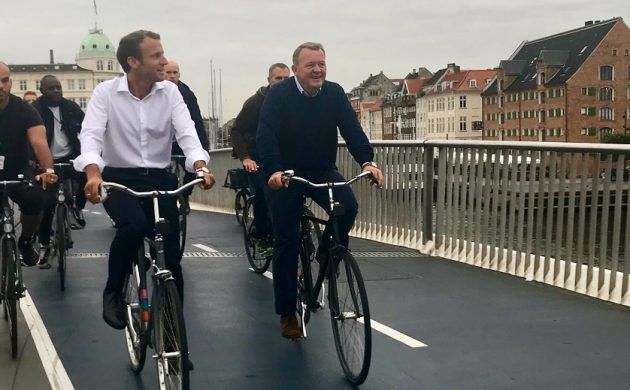A long line of world leaders congratulated French President Emmanuel Macron following his election win over the weekend.
Macron won the election ahead of right-wing candidate Marine Le Pen, much to the satisfaction of PM Mette Frederiksen.
“France is a very important European partner for Denmark and I look forward to continuing our good and constructive co-operation,” she wrote on Twitter.
READ ALSO: Danish PM visits Zelenskyy in Ukraine
A win for Europe
Three former Danish PMs – Helle Thorning-Schmidt, Anders Fogh Rasmussen and Lars Løkke Rasmussen – also voiced their glee over Macron’s victory.
The two latter leaders mentioned it was, as opposed to the Kremlin, a good result for Europe.
“Relieved over re-election for Macron and choosing against right-wing nationalistic populism. Good for Europe, back for Putin,” wrote Rasmussen on Twitter.
More flexibility for Ukrainian kids
A new government agreement seeks to give municipalities greater maneuverability in terms of assisting refugee children from Ukraine. One aspect of the deal is making it possible for schools and vocational schools to teach the displaced kids and adults in their native Ukrainian language and in English. A broad majority of Parliament agreed to the new deal.
Huge influx of volunteers
The conflict in Ukraine has sparked a massive increase in volunteers lending a hand to aid organisations. Dansk Røde Kors and Dansk Flygtningehjælp have both reported a spike in volunteers offering assistance. From receiving about two-five applications a week before Russia invaded Ukraine on February 24, Dansk Flygtningehjælp now receives 30 to 50 applications weekly. Dansk Røde Kors reported that its number of volunteers has doubled to over 10,000 since February 24.
Danish Defence lagging behind
According to a new report from organisation Folk og Sikkerhed, Denmark Defence is weaker than its Nordic neighbours. As opposed to Sweden, Norway and Finland, Denmark lacks the necessary u-boats and ships needed to run military operations along coastal areas. And the number of tanks, fighter jets and conscripted soldiers is also considerably lower in Denmark than the other nations. Finally, Denmark could soon be the only Nordic country not spending at least 2 percent of its GPD on defence despite its NATO membership.
Bangladeshi climate challenges
In collaboration with the Royal Family, the government is dispatching a delegation to Bangladesh to take in first-hand accounts of climate vulnerability challenges. Led by the development minister, Flemming Møller Mortensen, and Crown Princess Mary, the delegation will also sign a co-operation agreement focusing on sustainable development. Bangladesh is situated in a river delta and the majority of the country is under 10 metres above sea level, making it the country in the world with the most people threatened by climate change consequences.
New tax deal with Sweden?
It is being reported by News Øresund that the Øresunds Agreement, the Danish-Swedish tax agreement in 2003, is to be re-negotiated in the near future. The negotiations seek to break down barriers and make life easier for border commuters, but Sweden has also expressed a desire that a greater portion of border commuter tax funds be sent back to their land of residence.
New Øresund transport declaration
Denmark and Sweden have reached an accord pertaining to a joint declaration of transit in the Øresund Region. The COVID-19 pandemic led to great transit challenges in the area and the two countries will now look into generating a more free and fluid transport corridor to Bornholm, Kastrup Airport and up through Sweden. However, the joint declaration will not alter the two countries being able to usher in travel-related restrictions in future pandemic situations.
Less dependency on Russian gas
The government has presented its ‘Denmark can do better II’ strategy, which seeks to wean the country and the EU off its dependency on Russian gas. The plan offers five specific tracks that will move Denmark in a greener direction and out of the gaping maw of Russian energy sources. Among other things, green district heating must be ushered in by 2028 at the latest as Denmark seeks to quadruple its land-based sustainable energy production by 2030.
German deal curbing wind gains
An agreement between German consumers of Danish wind energy and Danish wind turbine owners is temporarily shutting off turbines in Denmark. When there is excess wind-based electricity in north Germany, the Danish wind-turbine owners are paid a compensation that is so high that it is not financially viable to instead sell the green electricity in Norway or Sweden. The wind turbine downtime means the turbines have missed out on generating electricity that could power 300,000 homes annually.













